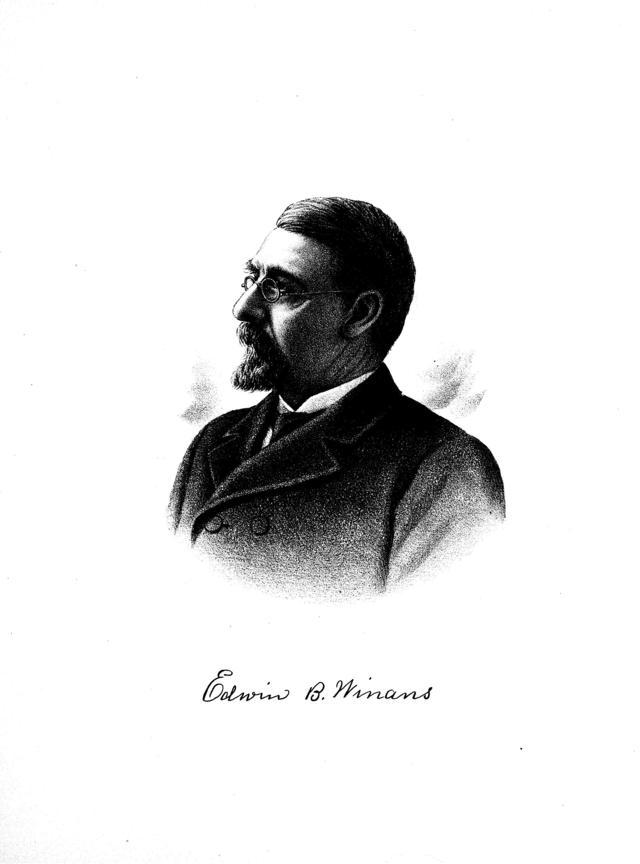Hon. Edwin B. Winans, who began his duties as Governor of Michigan, January 1, 1891, is a son of the Empire State, of which his parents also were natives. From German ancestry on the father’s side, he derives the instincts of frugality and careful consideration of ways and means, and these are strengthened by the substantial traits of the Puritan forefathers of his mother. Both lines have transmitted to him the love of country and home that has led thousands into untrodden wilds where they might secure that which would be for the future good of themselves and posterity.
John and Eliza (Way) Winans removed from New York to this State in 1834, and settled on a farm in Livingston County, where the boyhood of Governor Winans was passed. He was about eight years old at the time of the removal, having been born at Avon, Livingston County, N. Y., May 16, 1826. Up to the age of eighteen years he attended the district school, and he then entered Albion College, from which he was graduated in 1850. The excitement attendant upon the discovery of gold in California had not died out, and young Winans felt a strong desire to visit the coast and try his fortune in the mines. He decided in favor of the overland route, crossed the plains in safety, and spent the ensuing eight years in seeking the precious metal–a quest that was fairly successful.
Returning to Livingston county, this State, Mr. Winans bought land and engaged in general farming. He has retained the farm as his home through all the changes various official positions have brought him, and joyfully returned to it whenever his faithful discharge of public duty would allow. His estate now includes four hundred acres of land under a high state of cultivation and improved with buildings of the best construction and modern design. In connection with general farming Governor Winans has given considerable attention to raising stock of high grades, and his understanding of agriculture in its various departments is broad and deep. He believes that his success in political life is largely due to his thorough identification with the agricultural interests of the State and no doubt he is right.
The public career of Governor Winans began in 1860, when he was elected to represent his county in the State Legislature. He served two consecutive terms, covering the period from 18609 to 1965. In 1867 he was a member of the Constitutional Convention of the State, and in 1876 he was elected Probate Judge of Livingston county for a term of four years. the next important position occupied by Governor Winans was that of congressman during the Forty-eighth and Forty-ninth Congresses, representing the Sixth District. It was always his lot to be nominated for office when the Democratic party was decidedly in the majority, but such were his personal characteristics and his reputation as one interested in the welfare of that great class, the farmers, that in every case he made a successful race. When he was put up for congress the opposition had a majority in the district of three thousand votes, but he was elected by a plurality of thirty. While in Congress he took an active part in all measures tending tot he public good and served on the committees on Agriculture and Pensions. In the fall of 1891 his name headed the Democratic ticket and he was elected Governor of the State.
In his private life Governor Winans has been as exemplary as in his public career he has been useful and influential. He is a consistent member of the Episcopal Church and in his religious faith and practice has the close sympathy of his wife, who belongs to the same society. His marriage was solemnized in Hamburg, Livingston County, in 1833, his bride being Miss elizabeth Galloway, who was born and reared on the farm she still calls home, as it was bought of her father by Governor Winans. She is a daughter of George and Susan (Haight) Galloway, who are numbered among the early settlers of Livingston county, whither they came from New York. She is an educated, refined woman, whose mental attainments and social qualities fit her for the position which she occupies as hostess of the Gubernatorial mansion. Governor and Mrs. Winans have two sons, George G., who is now acting as his father’s private secretary, and Edwin B., Jr., a graduate of West Point.
Governor Winans has in former years shown himself capable of close application to the duties which lay before him, and his judicious decisions and wise course when attempting to bring about a worthy object, are well known to those who are acquainted with the history of the State. Although it is often said that it is scarcely safe to judge of a man until his career is closed, yet Governor Winans has acted his part so well thus far in life that he is confidently expected to add to the credit that already belong to the great commonwealth of Michigan, and which to a certain extent lies in the hands of those who have been and are its chief executives. Among his personal characteristics are those of a love of truth, justice and progress, and a cordial, kindly spirit which makes warm friends and stanch adherents.
Source: Chapman Brothers. Portrait and biographical record of Genesee, Lapeer and Tuscola counties, Michigan. Chicago: Chapman brothers, 1892.

